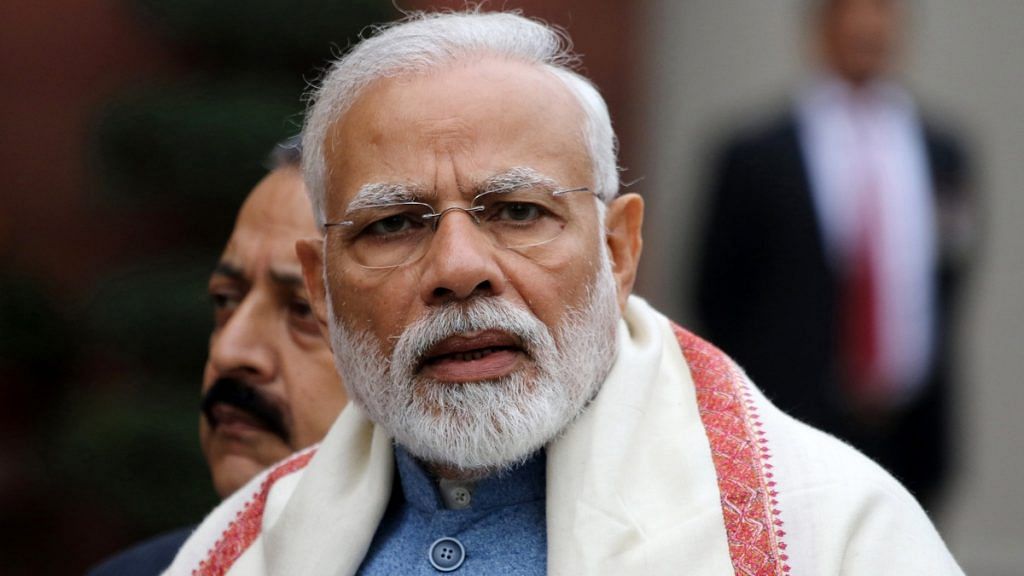On Sunday, voting ended in India’s seven-phase, six-week-long general election. Exit polls released that evening point uniformly in one direction: a comfortable win for Prime Minister Narendra Modi and his ruling Bharatiya Janata Party, and a rout for the Congress Party led by the Nehru-Gandhi dynasty scion Rahul Gandhi.
Indian exit polls have been proved wrong before — most spectacularly in predicting a BJP victory in 2004 — but at this point it’s safe to assume that Modi is winning a second term. What will this mean for how the world perceives India, and for US-India relations?
In my most recent Wall Street Journal column — read it here — I argue that, contrary to what Modi’s fervent fans believe, over the past two years the Prime Minister’s decisions have harmed India’s international standing.
Also read: Dear PM Modi, you’re spending too much time on Twitter and have got the media wrong
The Prime Minister’s unwillingness, or inability, to check the rise of figures considered too extreme for high office just a few years ago has inevitably affected how India is perceived in the world. A slew of stories in the international press have raised concerns about Modi’s empowerment of anti-Muslim bigots, including a woman on trial for a bombing that killed six Muslims. A recent cover story in Time asked whether India could endure another five years of Modi’s leadership. The Economist argued that under Modi the BJP poses a threat to Indian democracy.
When Modi first ran for Prime Minister, five years ago, he struck a Thatcherite note by promising “minimum government, maximum governance,” and swearing that “the government has no business to be in business.” But he has governed as a statist, raising tariffs, failing to privatise a single company, and focusing more on devising grand government programmes for the poor than on unleashing market forces to boost growth and create jobs.
In some ways, the world leader Modi resembles most is the Hungarian strongman Viktor Orbán. Like Orbán’s Fidesz Party, the BJP gins up hysteria against what it claims is a looming threat from immigrants. BJP president Amit Shah refers to Muslim migrants from Bangladesh as “termites.” Modi’s tenure has also seen the rise of aggressively pro-BJP TV news channels and websites that act as attack dogs for the ruling party. A giant social media operation linked to the ruling party smears government critics and opposition leaders.
Western NGOs have come in for special scrutiny. Those that have had run-ins with the Modi government include Greenpeace, the Ford Foundation and Amnesty International.
Modi’s fans do not appear to see a downside in any of this. In my recent travels in the populous Hindi heartland state of Uttar Pradesh, voters regularly praised the Prime Minister for “making India’s name shine in the world.”
They see United Nations recognition of an “international day of Yoga” (21 June), and widely publicised images of Modi rubbing shoulders with global leaders such as Barack Obama and Xi Jinping as evidence that India has arrived on the world stage. They also praise Modi for airstrikes against alleged terrorist training camps in Pakistan in February.
Also read: What message does it send when international media calls PM Modi “divider in chief”?
The view that Modi has boosted India’s international profile is not entirely without merit. During the first two years of his prime ministership, he fed off the aura created by his historic 2014 election victory, the first time in 30 years any party had won a single-party majority in Parliament, to project himself as a new kind of Indian leader — self-confident and assertive.
As the leader of the world’s fifth largest economy, and second-largest arms importer, Modi obviously commands a certain amount of global influence. As China rises, the importance of India as a potential counterweight has also risen in Washington. By all accounts, Modi has forged close relationships with Japan’s Shinzo Abe and Israel’s Benjamin Netanyahu.
Nonetheless, the BJP’s lurch toward hardline Hindu nationalism over the past two years carries costs for India. In March 2017, Modi appointed Yogi Adityanath, a Muslim-baiting Hindu cleric who ran a private militia to head Uttar Pradesh. This would be akin to the Republicans picking David Duke to lead California.
A series of mob-lynchings of suspected Muslim cattle traders — Hindus regard the cow as sacred — has stained India’s reputation as a bastion of religious pluralism in a rough part of the world. Apparently loath to alienate part of his base, Modi has failed to condemn these killings forcefully enough. Some of his ministers openly flaunt their sympathy for the alleged lynchers.
For two decades, the promise of the US-India relationship has rested on the twin pillars of shared interests and shared values. Both countries still share the important interest of preventing the rise of China as a hegemon in Asia.
Also read: PM Modi’s silence on Akhlaq murder in 2015 broke his global momentum
But unless Modi can find a way to reverse course and take his party on a more centrist course — an unlikely outcome if he wins big when results are announced this week — it will become harder to argue that the world’s oldest and largest democracies are bound by a common respect for democratic values.
This article was originally published in American Enterprise Institute.
